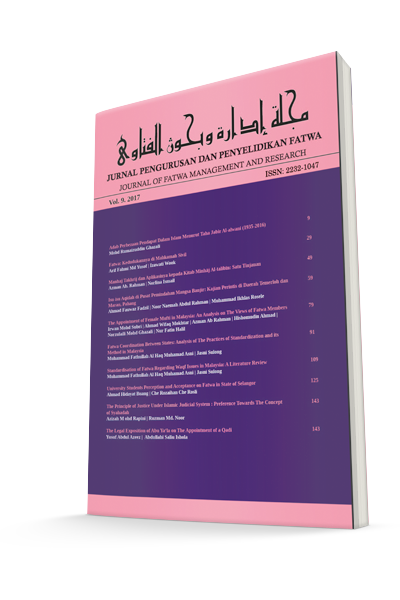Article

Shariah Attitude Towards Genetically Modified Foods: Aqli and Naqli Analysis
Jurnal Pengurusan dan Penyelidikan Fatwa Vol. 17 No. 1 (Page 14-28)View in JFatwa
Yasmin Hanani Mohd Safian (Author)
Abstract
Genetically modified (GM) food issue has sparked the debate, particularly in the Western world, on its detrimental effects to public health and the environment. Among the GM food producers and companies, the claim for intellectual property rights arise for food products and seeds for the technology they are licensing to farmers. For some Muslims and other God-conscious people, tampering with nature by implanting genes from one organism into another which nature has not sanctioned through natural processes and such legal claims is considered to be intolerable. The ‘terminator gene’ introduced by the companies are likely to lead to monopoly and encroachment of the world agro-economics, predominantly held in the hands of conglomerates. This study examines the Shariah attitudes towards GM food using aqli and naqli approach analysis. The aqli approach used in this paper includes analysis of modern scientific research to determine the benefits and harms of GM food. The naqli approach includes examination of related legal evidences from Quran, Hadith and scholars’ view. At the same time, the relevant Shariah principles are discussed to determine the validity of GM food
References
Ali, A.Y. 2000. The Holy Qur`an, Original Arabic Text with English Translation & Selected Commentaries. Kuala Lumpur: Saba Islamic Media. Al-Qur`an.
Bo Lonnerdal (2003). “Genetically Modified Plants for Improved Trace Element Nutrition”. The Journal of Nutrition. Vol. 133. 1490-1493
Brainy Encyclopaedia (2004) Genetically Modified Food. http://www.brainyencyclopedia.com/encyclopedia
Bukhari. Sahih Al-Bukhari. (trans). Muhammad Muhsin Khan. 1984. The Translation of the Meaning of Sahih Al-Bukhari. New Delhi: Kitab Bhavan. Vol. I-IX Al-Qur`an (Trans.)
Bushey, D.F., Bannon, G.A., Delaney, B.F., Graser, G., Hefford, M., Jiang, X., Lee T.C., Madduri K.M.,, Pariza, M., Privalle, L.S., Ranjan, R., Saab-Rincon, G., Schafer, B.W., Thelen, J.J., Zhang, J.X.Q., Harper, M.S. (2014). Characteristics and safety assessment of intractable proteins in genetically modified crops. Regulatory Toxicology and Pharmacology. 69. 154–170
Diaz, M. D. C. F., Gil-Delgado. M.D.L.R.C. 2003. “Is Intellectual Property Right Legislation Constraining the Agri-Food Biotechnology Center in the European Union?” (Research). The Sociology of Science and Technology Conference (SSTNET) of the European Sociology Association (ESA). Murcia, Spain. 24 September.
Doi, A .R. I. 1984. Shari`ah: The Islamic Law. Kuala Lumpur: A.S. Noordeen.
Ghana Public Health Association (2014). Recommendations from a meeting on health implications of genetically modified organism (GMA). Ghana Medical Journal, 48, 117-119. doi:http://dx.doi.org/10.4314/gmj.v48i2.11
Iversen M, Grønsberg, I.M, van den Berg, J., Fischer, K., Aheto, D.W., Bøhn, T. (2014) Detection of Transgenes in Local Maize Varieties of Small-Scale Farmers in Eastern Cape, South Africa. PLoS ONE 9(12): e116147. doi:10.1371/journal.pone. 0116147
Khan, S.A. 2003. “Neocolonialism in the Muslim World through Genetically Modified Foods: The Empire Strikes Back?”(Paper). The AMSS 32nd Annual Conference. Indiana University, Bloomington, Indiana. 26-28 September.
Konig, A.,Cockburnb, A., Crevelc, R.W.R., Debruyned, E. , Grafstroeme , R., Hammerlingf , U., Kimberg , I., Knudsenh, I., Kuiperi , H.A. , Peijnenburgi , A.A.C.M. , Penninksj , A.H. , Poulsenh, M. , Schauzuk, M., Wall, J.M. (2004) Assessment of the safety of foods derived from genetically modified (GM) crops. Food and Chemical Toxicology, 42, 1047–1088
Madeline, Ostrander (2014). Can GMOs Help Feed a Hot and Hungry World? The Nation. 23-27.
Mahmassani, S. 2000. Falsafat al-Tashri` fi al-Islam.
Monsanto. 2015. Research and innovation. Retrieved from http://www.monsanto.com/products/pages/vegetable-seeds-science.aspx 22/05/2015
Nasr, S.N. 1968. Man and Nature- The Spiritual Crisis of Modern Man. London: Unwin Paperbacks.
National as You Sow Foundation. 2003. “Risky Business-Financial Risks that Genetically Engineered Foods Pose to Kraft Foods, Inc. and Shareholders”. National as You Sow Foundation. www.asyousow.org
Nawawi, M. n.d. Al-Minhaj Syarh Sahih Muslim bin Al-Hajjaj. Mansoura: Maktabah Al-Iman.
OECD observer. “Intellectual property: rights and wrong”. http://www.oecdobserver.org/news/
Oraby, H., Shaffie, N., Ghaly, I. (2015). Biological impact of feeding rats with a genetically modified-based diet. Turkish Journal of Biology, 39, 265-275. doi:10.3906/biy-1406-61
Razi, F.M. 1997. Al-Mahsul fi `Ilmi Usul al-Fiqh. Al-`Alwani, T.J. (ed.). Vol.6. Beirut: Al-Resalah Publishers.
The Independent (1999). “The History of GM Foods”. http://www.global-reality.com/biotech
ThinkQuest 2000. 14 August 2000. “Pros and Cons of GM Food”. http://www.thinkquest.org
World Health Organisation (2015). Food, Genetically Modified. Retrieved from http://www.who.int/topics/food_genetically_modified/en/
Zahra, M.A. 1997. Usul al-Fiqh. al-Qahirah: Dar al-Fikr al-`Arabi.
Zahra, M.A. 2001. The Four Imams-The Lives and Teaching of their Founders. Aisha Bewley. (trans.). London: Dar Al Taqwa Ltd.
Zaidan, A.K. 1998. al-Wajiz fi Usul al-Fiqh. Beirut: Al-Resalah Publishers.
Zuhaili, W. 1998.Usul Fiqh Al-Islami. Damascus: Darul Fikr. Vol.I-II.
Zuhaili, W.1997. Al-Fiqh Al-Islami wa Adillatuh. Damascus: Darul Fikr. Vol. I-XI
URL
Back View in JFatwa

